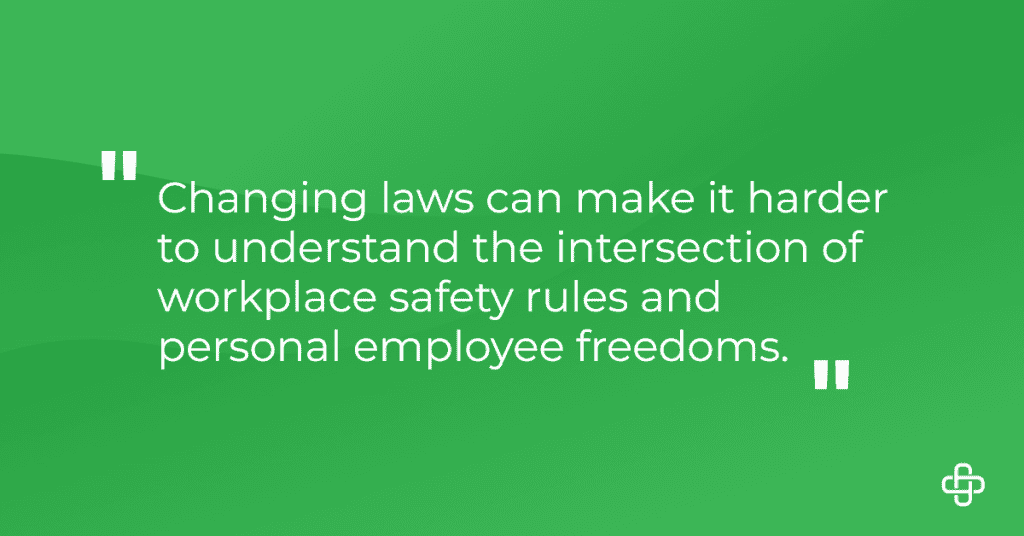Marijuana. From the late 1930’s to the mid 1990’s, it was essentially illegal across the United States. But the legal framework has become much murkier over the last thirty years. These days, employees at the same company but in different offices within the same state may be subject to vastly different drug laws

For employers, this can create a lot of confusion. Can you demand your employees to “just say no”? Or are they allowed a little leeway when it comes to recreational consumption? As more states legalize marijuana, the changing laws can make it harder to understand the intersection of workplace safety rules and personal employee freedoms.
Here’s a look at the current state of marijuana legality and how to address it in the workplace.
States Where Marijuana Is Fully Legal
Some states, like California, Colorado, and Washington, allow marijuana use for both medical and recreational purposes. However, these laws vary across counties or cities, even within the same state. For example, California allows local governments to set their own rules about marijuana sales and cultivation. To add to the complexity, California also protects employees who use medical marijuana outside of work under certain conditions.
States Allowing Medical Marijuana Only
Some states, like Texas and Georgia, permit marijuana use strictly for medical purposes while banning recreational use. Texas’s Compassionate Use Program, for example, has strict rules on who qualifies and how much THC is allowed. Similarly, Georgia allows limited forms of medical marijuana, such as low-THC oil, but its regulations are less structured, creating potential gray areas.
Even with these limits, employers still face challenges. Workers who use medical marijuana may request accommodation, but in safety-sensitive roles like operating heavy machinery or working on a rig, there’s often no room for negotiation. In states with less defined laws, miscommunication or misunderstandings can lead to disputes, unsafe behaviors, or unfair enforcement. To navigate these complexities, clear policies are essential to ensure both employee well-being and operational safety, especially in high-stakes industries.
States Where Marijuana Is Illegal
Some states, such as Idaho and Nebraska, have chosen to keep marijuana illegal. While this provides a simpler legal framework, employers in these states aren’t completely off the hook. Workers who travel or relocate from states with legal marijuana may expect more leniency, which can lead to challenges when enforcing policies. For companies that operate across multiple states, maintaining consistent rules can be particularly difficult.
Federal Laws vs. State Laws
At the federal level, marijuana is still considered an illegal drug. For industries like oil and gas, this can create major conflicts. Companies working under federal regulations, such as those required by the Department of Transportation or OSHA, must enforce drug-free workplace policies. These federal mandates take priority, particularly in safety-critical roles.
Meanwhile, some state laws protect employees who use marijuana off-duty. This puts employers in a tough spot, requiring careful attention to policies and legal compliance to avoid penalties or lawsuits. Further complicating this situation is the fact that traditional drug tests, like urine tests, can detect THC, the active ingredient in marijuana, but they can’t show whether someone is currently impaired. THC can stay in a person’s system for days or even weeks after use, so a test could be positive even if the employee hasn’t used marijuana recently.
Many businesses are now looking into better ways to detect real-time impairment. Options include training managers to spot impairment through behavior or using advanced testing tools that are still being developed.
Managing Safety-Sensitive Jobs
Industries with high-powered machinery or dangerous tasks rely heavily on safety-sensitive roles. For example, rig operators, welders, and pipeline workers have jobs where mistakes could result in serious injuries or worse.
Many states exempt these types of roles from employee protections for marijuana use. In fact, most heavy industry jobs fall under federal safety regulations (e.g., OSHA or DOT) which often require drug testing and prohibit marijuana use, regardless of state laws. This means employers have more freedom to enforce stricter rules. To avoid disputes, it’s critical to clearly define which roles count as safety-sensitive and communicate these rules upfront with employees.
Balancing Safety and Employee Needs
Some employees use medical marijuana to treat health conditions, which can lead to requests employers may want to accommodate. While it’s important to be fair and respectful, safety must come first in high-risk jobs. Employers should set clear, transparent policies and ensure they are applied consistently. It’s also a good idea to regularly consult legal experts to ensure policies comply with state and federal regulations.
Proactive Steps for HR and Safety Professionals
Here’s what HR and safety teams can do to prepare for these challenges while keeping workers safe:
- Stay Educated – Keep track of changing state and federal marijuana laws, especially if you operate in multiple states.
- Update Drug Testing – For employees in legal states who aren’t subject to federal regulations, review drug-testing methods to focus on detecting on-the-job impairment rather than just marijuana use in general.
- Train Managers – Teach supervisors how to identify signs of impairment and handle these issues fairly.
- Define Safety Roles – Clearly outline which jobs are safety-sensitive and require stricter rules.
- Consult Legal Experts – Work with attorneys regularly to make sure workplace policies meet legal requirements.
Moving Forward
Navigating the intersection of marijuana legalization and workplace safety is a challenge with no one-size-fits-all solution. Although dealing with marijuana in the workplace can be tricky, no employer should just choose to ignore it. Proactively addressing these issues with clear policies and open communication can help mitigate risks and foster a safer, more compliant work environment.
Watch our expert-led webinar, “Up in Smoke: Navigating the Haze of Marijuana Policies in 2025,” with Ogletree Deakins employment lawyer M. Tae Phillips and Axiom Medical’s Chief Medical Officer Dr. Scott Cherry to get crucial updates on evolving marijuana laws and to learn how to adapt your workplace policies accordingly.

Cain Boney is a contributor to Axiom Medical’s blog. With a career dedicated to writing about the workplace, Cain focuses on how employee well-being affects organizational success and sustainability in the long term.










